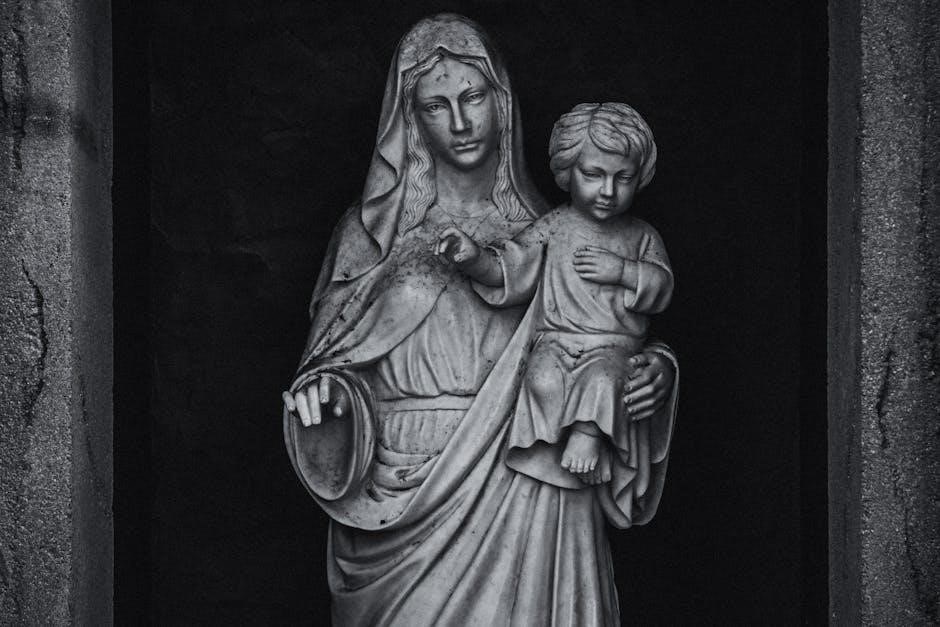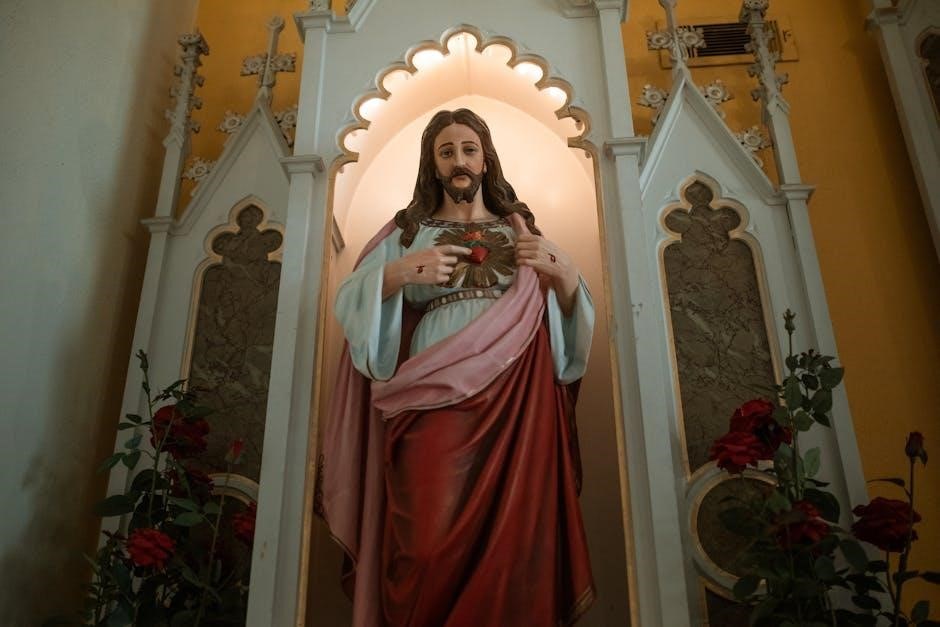Prophecies Fulfilled by Jesus: An Overview
Jesus fulfilled numerous Old Testament prophecies‚ confirming His identity as the Messiah. These predictions span His birth‚ life‚ death‚ and resurrection‚ showcasing divine precision.
From His virgin birth to His triumphal entry‚ Jesus’ life was a testament to prophetic fulfillment‚ solidifying His role as the promised Savior of humanity.
Messianic prophecies are foundational to understanding Jesus’ identity and mission. These predictions‚ scattered throughout the Old Testament‚ foretell the coming of a Savior who would redeem humanity. From His birth to His resurrection‚ Jesus fulfilled these prophecies with precision‚ confirming His divine purpose. The prophecies not only highlight His role as the Messiah but also demonstrate God’s sovereign plan for redemption. They serve as a bridge between the Old and New Testaments‚ illustrating how Jesus’ life‚ death‚ and resurrection were part of a larger narrative. These prophecies are a testament to God’s faithfulness and provide a rich tapestry of evidence for Jesus’ messianic claims.
1.2. Historical Context of Prophecies
The Messianic prophecies were written over a span of more than 1‚000 years‚ with contributions from various prophets in ancient Israel. These predictions were rooted in the cultural‚ religious‚ and historical context of the Hebrew people‚ who eagerly awaited a deliverer. The prophecies were diverse‚ addressing details such as Jesus’ birthplace‚ lineage‚ and manner of death. Their fulfillment in Jesus demonstrates remarkable accuracy‚ as His life aligned with these ancient predictions. This historical backdrop underscores the divine nature of the prophecies‚ showing they were not isolated statements but part of a cohesive plan. Scholars have long analyzed these prophecies‚ highlighting their significance in confirming Jesus’ identity as the Messiah.
1.3. The Significance of Fulfillment
The fulfillment of Messianic prophecies by Jesus holds profound theological significance. It validates His divine identity and mission‚ confirming Him as the promised Messiah of Israel. These prophecies‚ scattered across the Old Testament‚ were meticulously fulfilled in Jesus’ life‚ death‚ and resurrection. Their fulfillment demonstrates God’s sovereignty and the reliability of Scripture‚ offering compelling evidence for Jesus’ claims. The precision of these fulfillments eliminates coincidence‚ highlighting a deliberate divine plan. This validation reinforces faith in Jesus as the Savior and underscores the unity of God’s redemptive plan from Genesis to Revelation. The fulfillment of prophecy remains a cornerstone of Christian apologetics‚ affirming Jesus’ unique role in human history.

Prophecies Related to Jesus’ Birth
Jesus’ birth fulfilled key prophecies‚ including His virgin birth‚ Bethlehem origin‚ and lineage from Abraham and Judah‚ confirming His Messiahship and divine purpose from conception.
2.1. Born of a Virgin (Isaiah 7:14)
The prophecy in Isaiah 7:14 states that the Messiah would be born of a virgin‚ a miraculous and unparalleled event. This was fulfilled in Jesus’ birth‚ as recorded in Matthew 1:22-23 and Luke 1:26-31. The virgin birth underscores Jesus’ divine origin‚ separating Him from ordinary humanity and emphasizing His unique role as the Son of God;
This prophecy highlights God’s sovereignty and faithfulness in fulfilling His promises. The virgin birth of Jesus is a cornerstone of Christian theology‚ demonstrating the supernatural nature of His mission to redeem humanity from sin.
2.2. Born in Bethlehem (Micah 5:2)
Micah 5:2 foretells that the Messiah would be born in Bethlehem‚ a small Judean town. This prophecy was fulfilled when Jesus was born there‚ as detailed in Matthew 2:1-6 and Luke 2:4-7. Bethlehem’s significance lies in its historical connection to King David‚ emphasizing Jesus’ royal lineage and His role as the King of Kings.
The fulfillment of this prophecy validates Jesus’ identity as the promised Messiah‚ showcasing God’s meticulous plan and fulfillment of ancient promises. His birth in Bethlehem aligns with the divine blueprint for redemption‚ highlighting His mission to save humanity.

2.3. Descendant of Abraham and Judah (Genesis 12:3‚ 49:10)
Jesus fulfilled the prophecy of being a descendant of Abraham and Judah‚ as foretold in Genesis 12:3 and 49:10. These verses emphasize His lineage as part of God’s covenant people.
Genesis 12:3 highlights Abraham’s role in blessing all nations‚ while Genesis 49:10 points to Judah’s royal lineage. Jesus‚ born of Jewish heritage‚ fulfilled these prophecies‚ confirming His identity as the Messiah. His birth in Bethlehem and Davidic ancestry further solidified His claim as the King of Kings‚ destined to reign over God’s people and bring salvation to humanity.

Prophecies Fulfilled in Jesus’ Life and Ministry
Jesus’ life and ministry fulfilled numerous Old Testament prophecies‚ showcasing His divine authority and compassionate mission. His actions and teachings were foretold in detail.
3.1. Preceded by Elijah (John the Baptist) (Malachi 4:5-6)
Malachi prophesied that Elijah would return to prepare the way for the Lord. John the Baptist fulfilled this prophecy‚ acting as the forerunner to Jesus Christ.
John’s ministry of repentance and baptism mirrored Elijah’s role as a prophet calling Israel back to God. Jesus Himself confirmed this fulfillment‚ stating that John was the Elijah to come (Matthew 11:14).
This prophecy underscored John’s crucial role in preparing the hearts of the people for Jesus’ arrival‚ emphasizing the continuity of God’s plan across the Old and New Testaments.
3.2. Ministry of Miracles and Healing (Isaiah 35:5-6)
Isaiah prophesied that the Messiah would perform miraculous healings‚ opening the eyes of the blind and unstopping the ears of the deaf; Jesus fulfilled this during His ministry‚ demonstrating divine power and compassion.
He healed the blind‚ such as Bartimaeus and the man born blind‚ and restored hearing to the deaf‚ as recorded in the Gospels. These miracles not only confirmed Jesus as the Messiah but also revealed His identity as the Son of God.
Through these acts‚ Jesus embodied Isaiah’s prophecy‚ showcasing God’s redemptive plan and bringing hope to those in need. His miracles remain a testament to His divine nature and messianic mission.
3.3. Triumphal Entry into Jerusalem (Zechariah 9:9)
Zechariah 9:9 prophesied that the Messiah would enter Jerusalem humbly‚ riding on a donkey. Jesus fulfilled this prophecy during His triumphal entry‚ as crowds praised Him‚ waving palm branches and shouting‚ “Hosanna!”
This act symbolized Jesus’ identity as the Prince of Peace and the King of Israel. By choosing a donkey‚ He emphasized humility and peace‚ contrasting with royal conquest. The event marked a pivotal moment‚ as Jerusalem acknowledged Him as their Messiah‚ days before His crucifixion.
The fulfillment of this prophecy highlighted Jesus’ divine plan and His commitment to God’s will‚ even as He approached His sacrificial death. This event remains a powerful testament to His messianic identity and redemptive mission.

Prophecies Fulfilled in Jesus’ Death and Resurrection
Jesus’ death and resurrection fulfilled numerous Old Testament prophecies‚ including crucifixion‚ piercing of hands and feet‚ and resurrection on the third day‚ confirming His divine plan for salvation.
4.1. Crucifixion and Piercing of Hands and Feet (Psalm 22:16)
Psalms 22:16 prophesies‚ “They pierced my hands and my feet‚” a vivid description of crucifixion. This prophecy was fulfilled when Jesus was nailed to the cross‚ a method of execution that involved piercing His hands and feet with nails. The fulfillment of this prophecy is recorded in the New Testament‚ specifically in John 19:18‚ where it is written that Jesus was crucified alongside two others. The piercing of His hands and feet symbolized the extreme suffering He endured for the redemption of humanity. This prophecy‚ written centuries before the invention of crucifixion as a Roman punishment‚ underscores the divine plan and purpose behind Jesus’ death. The accuracy of this prophecy highlights the supernatural nature of Jesus’ mission and identity as the Messiah.
4;2. Given Vinegar and Gall (Psalm 69:21)
Psalms 69:21 foretells‚ “They put gall in my food and gave me vinegar for my thirst.” This prophecy was fulfilled during Jesus’ crucifixion when He was offered vinegar mixed with gall‚ a bitter substance‚ to drink. As recorded in Matthew 27:34‚ this act of offering vinegar and gall was both an attempt to alleviate pain and a form of mockery. The fulfillment of this prophecy demonstrates the meticulous detail of God’s plan‚ as even the smallest aspects of Jesus’ suffering were foreordained. This event not only highlights the physical torment Jesus endured but also serves as a profound illustration of His obedience to the divine will. The combination of vinegar and gall symbolized the bitterness of sin‚ which Jesus took upon Himself to atone for humanity’s transgressions. This fulfillment reinforces the veracity of biblical prophecies and the central role of Jesus’ sacrifice in the redemption narrative.
4.3. Resurrection on the Third Day (Psalm 16:10)
Psalm 16:10 prophesies‚ “You will not let your holy one see decay‚” foretelling the resurrection of Jesus. This prophecy was fulfilled when Jesus rose from the dead on the third day‚ as recorded in the New Testament. The resurrection was a pivotal event‚ confirming Jesus’ victory over sin and death. It also validated His divine nature and the fulfillment of Old Testament prophecies. Peter‚ in Acts 2:31‚ explicitly linked this prophecy to Jesus‚ emphasizing the certainty of His resurrection. The fulfillment of Psalm 16:10 underscores the reliability of Scripture and the central tenet of Christian faith—the resurrection of Jesus Christ. This event remains a cornerstone of belief‚ symbolizing eternal hope and salvation.

Additional Messianic Prophecies Fulfilled by Jesus
Jesus fulfilled additional Messianic prophecies‚ such as being the seed of a woman and bruising Satan’s head‚ further confirming His divine mission and redemptive purpose.
5.1. The Seed of a Woman (Genesis 3:15)
The prophecy in Genesis 3:15‚ “he will crush your head‚ and you will strike his heel‚” foretells the Messiah’s victory over Satan. This passage is the first Messianic prophecy‚ highlighting the seed of a woman‚ a unique concept as humanity typically traces lineage through men. Jesus fulfilled this by being born of a virgin‚ as recorded in Matthew 1:22-23 and Luke 1:26-31. This divine birth symbolized the ultimate triumph over evil‚ with Jesus’ life‚ death‚ and resurrection defeating Satan’s power. The prophecy also laid the foundation for other Messianic fulfillments‚ showcasing God’s redemptive plan from the beginning. Jesus’ virgin birth was a pivotal moment‚ fulfilling this ancient promise and setting the stage for humanity’s salvation.

5.2. Bruising Satan’s Head (Genesis 3:15)
Genesis 3:15 foretells the Messiah’s ultimate victory over Satan‚ stating‚ “he will crush your head‚ and you will strike his heel.” This prophecy signifies the defeat of evil through Jesus’ life and death. Jesus fulfilled this by defeating Satan through His death and resurrection‚ triumphing over sin and its consequences. The cross symbolized the bruising of Satan’s head‚ as Jesus bore the punishment for humanity’s sins‚ securing forgiveness and redemption. This victory demonstrated Jesus’ divine authority and established His reign over darkness‚ fulfilling the prophecy spoken at the dawn of human history. Satan’s power was crushed‚ and humanity was restored through Jesus’ triumph.
5.3. Bodily Ascension to Heaven (Genesis 5:24)
Genesis 5:24 describes Enoch’s miraculous ascension to heaven without experiencing death‚ serving as a foreshadowing of Jesus’ bodily ascension. This prophecy highlights the uniqueness of Jesus’ departure‚ as He‚ like Enoch‚ was taken up bodily into heaven. After His resurrection‚ Jesus ascended in His glorified body‚ witnessed by His disciples‚ as recorded in Acts 1:9-11. This fulfillment underscores Jesus’ divine nature and victory over death‚ offering hope of eternal life for believers. The bodily ascension also symbolizes the ultimate destiny of believers‚ who will one day be united with Christ in heaven.